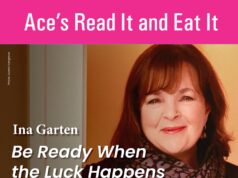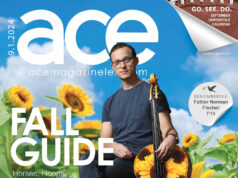Ace July 2000
The Hot Rod: Wild and Loose and at Long Last, Cool
by Chris Offutt
In 1998, I moved back to Kentucky for the fifth time. This time I was serious about my return. I’d been gone for ten years, during which I completed a graduate degree in creative writing, had two children, and published three books. Having a family and becoming a real writer were my two chief dreams of youth. Returning to Kentucky and living there forever was the third.
Oddly it never occurred to me to live anywhere else but Rowan County, surrounded by the hills I grew up with, amid the people I’d known all my life. My thinking was simple-I’d lived in cities before-Boston, New York, Albuquerque-and was tired of them. Frankfort held too many politicians, Louisville was more like a midwestern river city, and Lexington was just close enough to the hills to tease me unmercifully. The chief advantage of a city is the anonymity, the ability to go there and become an urban-dweller-which I had done. Anyone can go to a city and become someone else, someone different, someone we like. It is why people move to cities.
I was through with all of that and I wanted to go home, and home meant the hills. Living anywhere else but Rowan County would mark me forever a stranger, and therefore suspect. In twenty years my kids would be accepted, but I’d always be that guy from over near Morehead. Ironically, I now understand that if I had moved to Lexington, I might still be living in Kentucky.
I’d left the first time exactly 20 years before, at the age of twenty, in 1978. I had long hair and acne. My favorite band was Lynyrd Skynyrd-the greatest rock band America ever produced. It was also the year of their fateful plane crash. Our country had recently lost a war and seen its president driven from office. The era of free love had shifted to a time of bad drugs and disco music. People actually paid money for pet rocks. As my fellow Kentuckian Richard Hell so put it-I was a member of the Blank Generation.
The one advantage to coming of age in such a dark time was that muscle cars were still on the street. I loved the GTO, the Road Runner, the Barracuda, and the Firebird, but my absolute favorite was the Chevelle. As a teenager I had built several models of one, and had many photographs, carefully clipped from Car & Driver. I deeply envied those fortunate young men who drove the Chevelle, its little brother the Malibu, or its first cousin the Nova. For years, I dreamed of driving one with a lovely woman beside me, who was sure to kiss me later.
Now, twenty years later, I was coming home. At forty, I was the same age as Lynyrd Skynyrd lead singer Ronnie Van Zant when he died. My hair was short and my beard was grey. I was a husband, a father, and a college teacher. My favorite music had shifted to fifties jazz. The family car was a totaled Honda with a hundred thousand miles on it.
I’d left on foot with a backpack and was returning in a moving truck full of furniture. I was also bringing back a 1968 Malibu-red with a black interior. It had a shifter kit, short pipes, a 327 cubic inch engine, mag wheels, and a double-pump carburetor. Like me, the body was beat to pieces, but it would run like a scalded dog. That car was unbelievably fast, able to reach a hundred miles per hour in less than eight seconds. As we said in 1978, that rig would shit and git it.
In my life I have not much cared for possessions. Nearly everything in my house is secondhand. I have no qualms about giving things away, selling them, or merely abandoning them. My most prized possession is a battered stuffed bear that my grandmother gave me the day I was born. Everything else can go to the Salvation Army where it originally came from.
All this changed with the Malibu. I absolutely loved that car. I loved how it looked, I loved driving it, and I loved how people looked at me when I drove it. And they looked plenty because the engine rumbled like a volcano into which old priests threw young virgins. When I drove it, my wife literally could hear me heading home a mile away. My wife also loved that car.
Rita was born and raised in New York City, the daughter of Polish immigrants who had each survived the Holocaust. When she was thirty years old, I taught her to drive a car, my grandmother’s Volkswagen that I had inherited. Later, I bought her the Honda. I took her to her first drive-in movie. She was from subway culture not car culture, and had never been inside a car as big as the Malibu. She said she’d lived in New York apartments that were smaller. She sprawled luxuriously in the front seat as if on a couch. She called it the hot rod.
The first thing I did when I got home was put Lynyrd Skynyrd in the tape deck and drive down Main Street Morehead. I drove slowly. I obeyed the traffic laws. I drank a bottle of Ale-8. I ignored the open stares from children and adults. I pretended not to notice the cool young people who were pretending not to notice me. I drove through town and back ten times, and on the last trip, I chirped a black mark on the pavement right in front of the cool people. I can’t remember being so happy.
During high school, I rode the school bus all the way through senior year. Definitely not cool. On the few dates I could muster I drove the family car-a yellow Volkswagen hatchback. Most definitely not cool. Now, despite the grey in my beard and my community status as father and teacher, I was finally cool.
It has long been my practice to take Rita out to lunch every Friday, a habit that has helped our marriage tremendously. In Morehead, however, we quickly exhausted lunch options after a month. The Dixie Grill. The Amish store across the line in Fleming County. The Mexican place that impressed everyone because the workers were real Mexicans. The Chinese place that scared everyone because the workers were real Chinese.
We switched the Friday ritual to driving around Rowan County in the Malibu with sandwiches and bottles of cold Ale-8. On the surface I was giving Rita private tours of my home, but now I realize that I was really trying to learn who I had been twenty years ago, attempting to make peace with my past. I was visiting the land as if it was a long-lost relative who could impart family secrets. There were changes in my hometown of Haldeman-blacktop instead of dirt roads being the most obvious. My grade school was closed. The post office was closed. The only store was closed. A dangerous curve had been straightened, and the railroad tracks were peeled from the earth. But the land remained-those wondrous hills full of dense foliage. The creeks rushed off the slope to trickle through a hollow. The glory of morning birdsong began each day. The sky was a blue so crisp and taut you expected it to snap in the wind.
Rita was wonderful on these excursions into my soul. She endured my tears over sad memories, and my telling of personally meaningful stories that came out flat and dull. She patiently waited while I stopped the car to admire a view. It was not the land that she enjoyed, but the car. The throbbing engine thrilled her. She loved its speed and power.
On a warm Friday we drove east into the hills and turned up Buffalo Hollow, once a dusty road with a few houses. Like much of rural Kentucky, the road was tarred now and lined with trailers. I continued, knowing that I would eventually find the dirt roads I loved, the tight green walls of the hills on either side. Twenty years ago this had been a favorite necking spot for young people, a place I had always hoped to bring a girl, a circumstance that never happened. I didn’t know how to convince her that I wasn’t actually driving there with a sexual agenda in mind, when in fact I was. It never occurred to me that she might be as interested as I was.
The road tightened and turned to gravel, then dirt and finally became two ruts with grass between. I parked the Malibu in a wide spot and cut the engine. Beside us, the creek was the only sound running over rock. There were no cars or dogs. Rita scooted close to me and we began to kiss. Slowly I touched her legs and her neck and everywhere between. Time stretched, snapped, and disappeared. We entered our own zone in which nothing existed except the car and our bodies. We moved from necking to petting, then heavy petting, and finally the passionate making of love. Rita was never so beautiful. Sex was never better.
Afterwards I told her that this was something I’d dreamed of doing for many years. She was confused and rightly so-we’d been married for 12 years. I explained the history of Buffalo as a site for romance, and the significance of the Malibu as the cool car of the era. She told me it was wonderful. She was glad I’d brought her here. She suggested that I write about it for the new book, and I told her I couldn’t possibly write about sex in a Malibu on a dirt road in the middle of the day in the hills. People might get the wrong idea. They might think I was wild and loose.
She looked me in the eyes and said, “You can write about anything you want, Chris. You’re a writer. This isn’t 1978 with some girl, this is 1998 and I’m your wife.”
She was right, of course, and I hugged her tightly. I’d finally accomplished one of my dreams, one I’d forgotten about until coming home. Other things happened of significance during the year, but many of them were sad. This was a high point-at 41 I became the teenager I always wanted to be.
I put the car in gear and drove sedately out of the hollow. On the way home we played “Free Bird.” Then we stopped by the grade school and picked up our kids and took them to the Dairy Queen for dilly bars.







